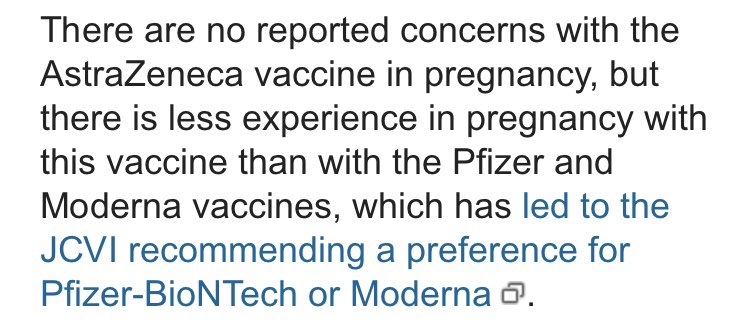
@ElonaWise Your decision will depend on lots of factors that are specific to you. How prevalent is COVID in your area? Are you very exposed? Do you have any conditions that put you at increased risk? All of this you can discuss with your care team to make a personalised decision. But... 1/
@ElonaWise I can tell you the pros and cons of vaccination during pregnancy in general. Let's start with the pros... 2/
@ElonaWise 1. Not getting COVID! This is particularly important because catching COVID in late pregnancy is associated with an increased risk of preterm birth, stillbirth and your baby needing to spend time in intensive care. 3/
bmj.com/content/370/bm…
bmj.com/content/370/bm…
@ElonaWise 2. People who are vaccinated during pregnancy pass on some antibodies to their baby via the placenta. Based on what we know of other diseases, we expect this to give your baby some protection against COVID once he or she is born. 4/
@ElonaWise Links to papers on this... 5/
bmcpediatr.biomedcentral.com/articles/10.11…
sciencedirect.com/science/articl…
ajog.org/article/S0002-…
biorxiv.org/content/10.110…
medrxiv.org/content/10.110…
bmcpediatr.biomedcentral.com/articles/10.11…
sciencedirect.com/science/articl…
ajog.org/article/S0002-…
biorxiv.org/content/10.110…
medrxiv.org/content/10.110…
@ElonaWise So now let's look at the potential cons. Is it safe? We now have a really big study from the USA that looks specifically at this. 6/
nejm.org/doi/full/10.10…
nejm.org/doi/full/10.10…
@ElonaWise This study followed up 35,691 pregnant ppl who received a COVID vaccine for 7d after each dose, and then contacted 3958 of them again months later to see how their pregnancy had gone. By this time, 724 babies had been born. 7/
@ElonaWise The study found no increased risk of any pregnancy-specific adverse event associated with vaccination, eg. miscarriage, preterm birth. 8/
@ElonaWise We also have large datasets that are collected through schemes like VAERS (also reported in this paper), Yellow Card and Eudravigilance that allow people to report any adverse event. These have also not found any safety signal for vaccinating in pregnancy. 9/
@ElonaWise So on the one hand, you have definite risks of COVID that vaccination can help you avoid. On the other, the data we have so far suggests that the vaccines themselves are safe during pregnancy. 10/
@ElonaWise I hope the data helps you to make a decision, but do have a chat with your own care team so that they can factor in any personal circumstances. 11/11
• • •
Missing some Tweet in this thread? You can try to
force a refresh










